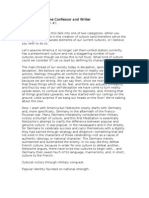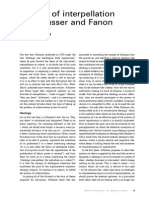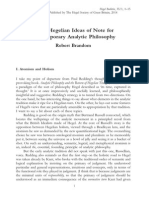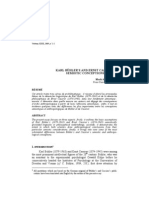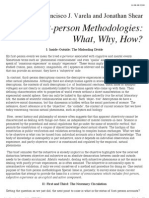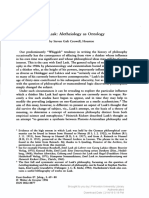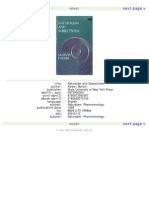Dagfinn Follesdal - Analytic Philosophy
Dagfinn Follesdal - Analytic Philosophy
Uploaded by
Mircea SerbanCopyright:
Available Formats
Dagfinn Follesdal - Analytic Philosophy
Dagfinn Follesdal - Analytic Philosophy
Uploaded by
Mircea SerbanOriginal Description:
Copyright
Available Formats
Share this document
Did you find this document useful?
Is this content inappropriate?
Copyright:
Available Formats
Dagfinn Follesdal - Analytic Philosophy
Dagfinn Follesdal - Analytic Philosophy
Uploaded by
Mircea SerbanCopyright:
Available Formats
I
ANALYTIC PH ILO SO PH Y : W H A T IS IT AND WHY
SH O U LD ONE ENGAGE IN IT?
Dagfinn Fallesdal
In surveys of contemporary philosophy, it is customary to
distinguish two main currents: the analytic and the continental.
Analytic philosophy is then in turn divided into two principal
traditions: one inspired by logic, of which Bolzano, Frege and
Russell are the early main protagonists, and one oriented towards
ordinary language, in which G. E. Moore, the later Wittgenstein
and J . L. Austin played a central part. Continental philosophy, by
^Contrast, comprises trends such as phenomenology, existentialism,
hermeneutics, structuralism, deconstructivism, neo-Thomism, neoKantianism, neo-Marxism, as well as assorted other neo-isms:
A N A LY TIC
P H IL O S O P H Y
togiczl
ordinary
language
C O N T IN E N T A L PH IL O SO PH Y
pheno
menology
existent
ialism
herm en
eutics
structural
ism
deconstructm sm
neoThom ism
neoMarxism
.^ A n a ly tic philosophy has dominated in the English-speaking
^ world for the last sixty years and is now encroaching upon the
^ continent. This distresses some, who regard analytic philosophy as
v anathem a, as a turning away from serious philosophy. Others greet
; it as a happy development; they regard analytic philosophy as
K something positive. J u st as there are societies and journals for
phenomenology, existentialism and other varieties of continental
philosophy, there have during the last decade been established
r . societies and journals for analytic philosophy, such as Ratio.
, ' Yet, when we ask W hat is analytic philosophy? it is not easy to
find an answer. Like most labels, it is highly malleable and can be
molded to different purposes, in particular the following two:
(1) Polemics. Label polemics is rather widespread, because it is so
easy: First one defines a label in such a way that it stands for a view
that it is easy to refute. In the best cases, one is able to find
somebody who actually has this view. However, the more stupid
the view, the less evidence is supplied that anyone actually has it.
This is, however, a minor m atter compared to the next step: one
DAGFINN F0LLESDAL
such a way that it fits the great variety of philosophers who are
normally called analytic. In this article I shall do the latter.
Doctrines, Problems, Approaches
Some philosophical currents, such as phenomenology, are deter
mined by their perspectives or doctrines. A phenomenologist is
someone who has distinctive views about intentionality and other
related topics. Neo-Thomists, neo-Kantians, neo-Marxists, etc.,
are equally characterized by their views. This does not hold, how
ever, for hermeneutics, which is defined rather by its range of
problems. Hermeneutics is concerned with questions of understand
ing, and with the interpretation of texts and other manifestations
of the hum an mind, to speak with Dilthey. It only engages the
many other problems of philosophy in so far as the latter are
connected with understanding and interpretation. But as regards
their views, the various proponents of hermeneutics differ sharply.
Even at this stage, therefore, it is apparent that the standard
classification of the main currents of contemporary philosophy
conflates two distinct principles of classification: doctrines and
problems. Furtherm ore, the tradition with which we are concerned,
analytic philosophy, cannot even be characterized by reference to
either doctrines or problems. Analytical philosophers discuss a
variety of philosophical problems, and they hold utterly different
views about these problems. I know of no philosophical view which
is shared by all or even most analytic philosophers, at least not of a
view which is not completely trivial. In my view, what distinguishes
analytic philosophy is rather a particular way of approaching
philosophical problems, although, as we have seen, this approach
must not be identified with a specific method of analyzing
philosophical concepts. But in what does this distinctive approach
consists? This is the question that will occupy us now, and it is not
an easy one.
Genetic affiliation: schools
But before we turn to this question, let us first note that by now we
have encountered three different principles of classification:
according to doctrines, according to problems, and according to ways o f
approaching them. We jum p from the one to the next and to the
third, as in the Chinese encyclopedia, and without a unifying
principle of classification. For any classification, this is a serious
ANALYTIC PHILOSOPHY
difficulty. Hence, before attem pting to characterize analytic philo
sophy, we should consider an alternative principle of classification,
which may have occurred to you already: perhaps the classification
o f currents of philosophy should be regarded as a genetic
classification, a classification of philosophical traditions, of schools of
pkiMsophers, of philosophers who are teachers and pupils, engage in
jdebate with one another, and go back to the same philosophical
foots.
* This classification works well with some major currents:
phenomenology, neo-Thomism and other neo-isms. Yet it does
aot work so well for hermeneutics. In antiquity, the Middle Ages
and in early modern philosophy, one already finds hermeneutic
endeavors. These endeavors were often undertaken in isolation,
"and without knowledge of one another. Nevertheless, they have in
Common that they have contributed to a philosophical under^standing of the topic of understanding and interpretation. Similarly
for existentialism, where one finds early existentialist outsiders
such as Augustine.
There have been attem pts to bring analytic philosophy within
the ambits of such a genetic scheme of philosophical schools. For
example, it is often claimed that analytic philosophy began with
Frege and Russell (the logical branch) and G. E. Moore (the
ordinary language branch). It has even been claimed that 1903 can
be regarded as the year of birth of analytic philosophy, because of
--he simultaneous publication of Russells Principles o f Mathematics
and M oores Refutation of Idealism. But this claim is not entirely
serious. It will be easily granted that more than twenty years
earlier, Frege already engaged in analytical philosophy. However,
Frege does not create problems for the genetic classification of
philosophical trends. After all, his writings were thoroughly studied
by Russell, and in Principia Mathematica Russell and Whitehead
write that in all questions of logical analysis, our chief debt is to
Frege.4 All that is required to include Frege among the analytic
philosophers is to shift its date of birth from 1903 to 1879, the year
in which Begriffsschrift was published.
Nevertheless, the conception of the main currents of philosophy
as philosophical schools is unsatisfactory. I have already mentioned
the problems in the case of hermeneutics and existentialism. In
rthese cases, philosophers are grouped together not because they are
* Alfred North Whitehead and Bertrand Russell, Principia MatkemaHca (Cambridge:
-C.U.P., 2d ed., 1925-27 (1. ed. 1910)), p. viii.
DAGFINN F0IXESDAL
teachers and pupils, but because they tackle the same problems.
In my view, analytic philosophy creates even more serious
problems than hermeneutics and existentialism for the view that
the main currents of philosophy consist of schools of thought. Take
as an example Bernard Bolzano.
In my view, Bolzano, born in 1781, was an outstanding analytic
philosopher. Early in the nineteenth century he anticipated many
central ideas of Frege, C arnap, Tarski, Quine and others, and
tackled them in an exemplary fashion. It is with good reason,
therefore, that Anders Wedberg starts the last volume of his history
of philosophy, the presentation of contemporary philosophy, with a
chapter on Bolzano.5 Then follow Frege, Russell, Moore, and the
other philosophers of our century. To say that Bolzano is an
analytic philosopher cannot mean that Frege, Russell, Moore and
other analytic philosophers are pupils of Bolzano. Frege does not
mention Bolzano, and seems not to have known of him at all. It is
not improbable that some of Bolzanos impulses reached him via
intermediaries. But to back the genetic thesis that Bolzano exerted
a decisive influence on Frege, one would have to believe in the
migration of souls: Frege was born in 1848, the year of Bolzanos
death (however, Bolzano died six weeks after Freges birth).
It appears that Russell did not know of Bolzano either, in spite of
the fact that Bolzano dealt at length not only with the philosophy of
logic and the philosophy of language, but also with other topics on
which Russell worked, such as the philosophy of Leibniz. Bolzano
remained generally unknown until the work of Heinrich Scholz, of
Kaila in Finland and of Wedberg and his pupils. U ntil recently, for
example, there was no entry on Bolzano in the Encyclopedia
Britannica. Only Husserl paid attention to Bolzano; he explicitly
thanks him in Logiscke Untersuchungen as well as in other works. If
the main currents of philosophy are schools, for which teacher/
pupil relations and actual influence are decisive, Bolzano must be
regarded as a phenomenologist. However, in his work one
encounters very little of the views about intentionality and related
themes that characterize phenomenology. Instead, all those who
have studied Bolzano have concluded that he is a typical analytic
philosopher. Great grandfather of analytic philosophy Dummett
called him, thereby claiming only a systematic connection, not a
genetic one.6
5 Anders Wedberg, A History o f Philosophy, Vol. 3: From Bolzano to Wittgenstein (Oxford:
Clarendon Press, 1984; Swedish ed. 1966).
6 Michael Dummett, The Roots o f Analytic Philosophy (London; Duckworth, 1993), p. 171.
ANALYTIC PHILOSOPHY
r:
^
For this reason we are well advised to abandon the idea that the
classification of philosophical currents is a genetic classification of
philosophical schools. This may hold true of neo-Thomism, neoKantianism, neo-Marxism, etc., but hardly of any other currents.
^ Some currents, such as phenomenology, are characterized by
certain views or theses, others, like hermeneutics, by a particular
"range of problems. W hat we have here is a mixture of diverse
' criteria, but no common basis of classification, a situation similar to
that of the Chinese encyclopedia.
But analytic philosophy continues to demand our attention. We
have not yet established what it is. We have a few negative answers:
aiS&Iytic philosophy is not a school, one can be an analytic
^philosopher without having studied other analytic philosophers,
; aadT without in turn influencing other analytic philosophers.
i4&xceovtr, there is no philosophical view or method of conceptual
analysis which is shared by all or most analytic philosophers. But
w ia t can we say positively about analytic philosophy? I have already
mentioned that analytic philosophy appears to be characterized by
its way of approaching philosophical problems. The question is
f therefore: what characterizes this approach?
have alreay remarked that there are many analytic philosophers,
such as Quine, who do not fit the view of analytic philosophy as a
kind of conceptual analysis. It is true that analytic philosophers like
so investigate language. But philosophy of language is only part of
analytic philosophy. Analytic philosophers can be found in all
areas of philosophy, for example in epistemology, ethics, aesthetics,
ptutoiophy of mind and metaphysics. Moral philosophers like
Rawls' only rarely pronounce on language and the philosophy of
and yet they are analytic philosophers.
Br
h
Argument and justification
"answer to our question is, I believe, that analytic philosophy
is very strongly concerned with argument and justification. An
analytic philosopher who presents and assesses a philosophical
position asks: w hat reasons are there for accepting or rejecting this
position? This question necessitates an investigation of what
follows from the position at issue, and from what other positions it
Cam be'derivSd. How can one strengthen or invalidate this position?
T h s is what is usually m eant when one asks: what precisely does
position mean? O ne then discovers that minute differences in
DAGFINN F0LLJSSDAL
the way a position is formulated determine Whether it is acceptable
or not.
This, I believe, is one reason why analytic philosophers are so
often concerned with analyzing language. Linguistic analysis is
necessary to avoid ambiguities and unclarities which may be
crucial to the validity of a line of argument.
To be sure, there are analytic philosophers who claim that
successful linguistic or conceptual analysis is the only aim of
philosophy. G. E. Moore was of this opinion, as was Wittgenstein,
early as well as late. In philosophers who have been influenced by
Moore and Wittgenstein, one often encounters this idea. Thus
Schlick writes in his well-known essay The Turning Point in
Philosophy, which introduced the first volume of the journal
Erkenntnis:
By means of philosophy statements are explained, by means of
science they are verified. The latter is concerned with the truth of
statements, the former with what they actually mean.7
The same contrast between science and philosophy is also evident
in W aism anns aforementioned essay W hat is logical Analysis?:
. . . philosophy and science express two very different types of
attitude of the human mind. The scientific mind searches for
knowledge, i.e. for propositions which are true, which agree with
reality. On a high level, it rises to the construction of a theory
which connects the scattered and in their isolation unintelligible
facts and in this way explains them. . . . Now, what can be
gained through philosophy is an increase in inner clarity. The
results of philosophical reflection are not propositions but the
clarification of propositions.8
By contrast, other analytic philosophers, indeed a majority, hold
that philosophy is concerned with truth. M any of them also believe
that it resembles science. Thus, in the twenties Russell wrote that
philosophy is essentially one with science, differing from the
special sciences merely by the generality of its problems.9 Similar
views are to be found from Mach to Quine.
7 The Turning Point in Philosophy, in A .J. Ayer (ed.), logical Positivism (New York:
Free Press, 1959), p. 56. German original Die Wende der Philosophie, Erkemtnis 1 (1930/
31).
8 Loc. cit., p. 81.
9 Sceptical Essays (New York: Norton, 1928), pp. 69-70.
ANALYTIC PHILOSOPHY
r In the same vein, Frege writes that his attempts to clarify
language do not constitute his real aim. He never believed that
philosophical problems could be solved through the analysis of
language, but only that such analysis can help us to understand the
' problems better. He certainly would not have shared Wittgensteins
slew th a t linguistic analysis provides the solution to philosophical
problems ,*as is maintained in the Preface of the Tractatus, or that
the root of the problems lies in language, as we read in several
places in Philosophical Investigations.
^ This provides a good illustration of my contention that analytic
philosophy cannot be identified by reference to a collection of
shared theses. Even in response to a fundamental question like
'W hat is philosophy?, analytic philosophers provide totally differ i t .answers. Nevertheless, no one can seriously doubt that these
.philosophers - Moore, Wittgenstein, Schlick, Waismann, Russell
and Frege, and analytic philosophers.
. J*o r this reason the emphasis on argument and justification
seems to me more characteristic of analytic philosophy than a
concern with conceptual analysis, which forms only a part of it. My
thesis, that analytic philosophy is not characterized by specific
doctrinel'or problems but by argument and justification can easily
be checked. To refute it, one need only find philosophers whom we
: regard as analytic, but who care little about argument and
justification.
Srm
Wittgenstein
Wittgenstein and his followers immediately come to mind. Do we
find arguments and justification by these philosophers? O r are they
perhaps not analytic philosophers after all? Von Wright, an
outstanding analytic philosophers, has intimated the latter, and
&e writes of W ittgensteins later philosophy that its spirit is alien
an d even hostile to the typically analytic approach.10
It is not surprising, therefore, that the late Russell regarded the
influence of W ittgenstein on the subsequent development of
philosophy as a misfortune. In a review of J. O. Urmsons book
F'ktlosopkkal Analysis: Its Development Between the two World Wars
Russell expressed his aversion as follows:
w Georg Henrik von W right, Analytic Philosophy: a Histori co-Critical Survey.
Reprinted in von W rights The Tree o f Knowledge and Other Essays {Leiden Brill. 1993) p. 32.
10
DAGFINN F0LLESDAL
The later W ittgenstein . . . seems to have grown tired of serious
thinking and to have invented a doctrine which would make
such an activity unnecessary. I do not for one moment believe
that the doctrine which has these lazy consequences is true. I
realize, however, that I have an overpoweringly strong bias
against it, for, if it is true, philosophy is, at best, a slight help to
lexicographers and at worst, an idle tea-table am usem ent.11
What is argument and justification?
For reasons that I will discuss later, I regard argument and
justification as very im portant elements of philosophical activity,
and, where they are absent, I become skeptical. However, I have a
broad conception of w hat to count as argum ent and justification.
As we all know, in philosophy, as in other areas, argument
means more than just deductive argument. The theory of deductive
argument is very well developed, and familiarity with deductive
argument is im portant for understanding and applying other types of
argument. The types of argument which we encounter in philosophy
and other areas are usually variants of non-monotonic arguments,
that is, arguments in which adding new premisses may cast doubt
on a conclusion that would follow without these premisses.
Philosophy also consists of intricate descriptions of emotions and
of human attitudes and activities such as perception. Here we are
eager to find forms of description and distinctions which suit the
material, while at the same time creating clearness and cohesion.
Clearness and cohesion are key concepts in philosophy. Perhaps
even more than in the special sciences, philosophy desires to see
how all one common weft contrives, each in the other works and
thrives (wie alles sich zum Ganzen webt, eins in dem andern wirkt
und iebt).12
In philosophy, as in other sciences, it is necessary to alternate
between the investigation of general connections and details. The
theory of the general connections must fit the details, and the
details must find a place in the more general theory. It is through
this kind o f reflective equilibrium that we arrive at justifications of
our philosophical insights, of the general insights as well as of the
detailed, specific ones. Goodman, Israel Schefiler and Rawls have
u From the reprint in Bertrand Russell, My Philosophical Development (New York: Simon
and Schuster, 1959), pp. 216-7.
12 Goethe, Faust I, verse 44-7 fF.
ANALYTIC PHILOSOPHY
1J
introduced this idea into the contemporary debate. The question of
' "wfeat sound argum ent and valid justification am ount to is itself a
question within analytic philosophy. Moreover, it is an important
Jlmc* W hich can be answered in diverse ways.
L."*
beginning of our century, Husserl had already proposed a
' conceprioTi of justification similar to that of Goodman, Scheffler
Rawls. H e writes that the unity that ties together the various
statements of a treatise or theory confers an interrelated validity
/o n these statem ents.13 Husserl also emphasizes that the manifold
prelogical validities act as ground for the logical ones.14 W hat I
f e d particularly interesting in Husserl is that he, even more than
Goodman, Scheffler and Rawls, reflected on the question of why
5 this kind of connection confers validity. In his view, the reason is
^"that the opinions (Auffassungen) on which we ultimately rely are
s o t thematized by us, and in most cases never will be. Each claim
i to validity and truth is founded on this life-world of non-thematized
opinions which we have never made the subject of any judgm ent,
f O ne might think that this only makes matters worse. Not only do
we rely on something uncertain, but on something which we never
: tiioaght of. and which, consequently, we have never subjected to
: conscious scrutiny. Husserl maintains, however, that it is precisely
I tfec tjou-thematized nature of ones opinions which makes them the
[ hsz court of justification. In his view, accepting and believing
f- i r r not attitudes which we adopt on the basis of deliberate
iStcsions. W hat we accept, and the notion of accepting itself, are
1 part o f our life-world; and, according to Husserl, there is no
'possibility of escaping this never thematized acceptance. I quote:
*1? is impossible to evade the issue here through a preoccupation
' "with aporia and argumentation nourished by K ant or Hegel,
| Aristotle or Thom as.15
| I regard this idea of H usserls as a stimulating contribution to
Lour contemporary discussion about ultimate justification and the
;.:t&rory- o f reflective equilibrium. Reflective equilibrium comes
closest to what I have called argument and justification in my
discussion of analytic philosophy. This idea provides us with a
'-ttfleieefMion of analytic philosophy that is open without being
' vacuous. The great heroes of analytic philosophy, such as Bolzano,
f
i
' Edmund Husserl, Erste Philosophie, 3. Vort. HusserSiana VII, 19. 33.
Zhe Crisis drr Europaiscken WissensckqfUn und die TranszindintaU PhanomemUgie, 34,
\ ffasseHiana VI, 127.15-16.
K4 Lac. tit.. 134, 35-37, David Carrs translation.
"
12
DAGFINN F0LLESDAL
Frege and Russell, fit well into this picture. Through the great
weight which they have given to argument they have contributed to
the philosophical enterprise insights into several general connec
tions, as well as detailed studies and distinctions. Yet, Moore and
W ittgenstein have also made im portant contributions. They give
little insight into general connections, but they have given
descriptions and drawn distinctions; moreover, they have detected
difficulties to which all attempts to provide a systematic philosophy
must be alive. Detecting difficulties is also an im portant contribution
to philosophy, indeed, a very im portant one.
Non-analytic philosophers
My characterization of analytic philosophy through the concepts
argument and justification might appear to be too open and
wide. Are there any philosophers which do not count as analytic by !
these lights? To take twentieth century philosophers as examples, I
think that my characterization does not fit Heidegger and Derrida.
Instead of arguments and justification, they predominantly make !
use of rhetoric; one finds in their work many of the traditional
rhetorical devices. Thus Husserl wrote in his copy of Being and
Time: W hat is said there is my own doctrine, but without its deeper
justification.16
j
Similarly for Derrida. Typical in this respect is his discussion s
with Searle. Searle defends himself against D erridas critique of his <
position on the grounds that he has been misunderstood and
misquoted. Instead of discussing these objections, Derrida takes to
addressing Searle as SARL (Societe anonyme de responsibility i
limitee), to indicate that Searle is not willing to take responsibility
!
for his positions. The audience applauded Derrida, but this is not i
analytic philosophy.
;
This is by no means to say that Heidegger, and perhaps even !
Derrida, could not provide philosophical insights. But to uncover
these insights it would be necessary to formulate their respective
views in a clear manner, in order to find out what can be adduced :
for or against them. The lack of argument and justification poses a
peculiar problem to such a reconstruction. Argument and justifica- j
tion contribute to the clarification of what is claims; where they are }
absent, interpretation becomes difficult.
\
16 Husserls copy of Being and Time, p. 62.
EC
ANALYTIC PHILOSOPHY
13
Hermeneutics and analytic philosophy
P 'M h i s excellent article Analytic Philosophy: a Historico-Critical
.
with which I am largely in agreement, von W right has
|7*iWiifadferi that hermeneutics is incompatible with analytic philoI, For my part, am of a quite different persuasion. Von
W
'Offers two main reasons for his thesis. Firstly, hermeneutics
emphasizes the difference between social sciences and humanities
the one hand, and natural sciences on the other. Emphasizing
this difference is at odds with the thesis of the unity of science.
^ Seamdly, according to von Wright, those analytic philosophers who
I have concerned themselves with questions of interpretation and
understanding, for example Quine, Sellars and Davidson, are
naturalists, while hermeneutics strives to conceive of human beings
a s Historical and cultural.
^ T h e problem with von W rights two reasons is that both analytic
f philosophers and proponents of hermeneutics have advocated
r Ten- diverse opinions. Not all analytic philosophers propound
t die thesis of the unity of science. M uch depends on how this unity is
f fit> be tmderstood. Nobody holds that the social sciences and
[ jsomanities conduct experiments of the kind common in natural
science. Only a few hold that the social sciences and humanities are
!Tdrafing with exceptionless covering laws like the natural sciences,
f * ra in the natural sciences, the idea of such laws has almost died
! oat, and with it the nomological-deductive method. By contrast,
! some of us mean something completely different by the hypothetico" deductive method: the hypotheses need not have the status of laws,
b a t rather of assumptions, which must be tested through their
; eoonections with other statements in the network of an overall
I theory.
r As an example of an analytic approach to hermeneutics I will
! fixation Wolfgang Stegmullers article The So-Called Circle of
f U nderstanding.18 This essay, as well as contributions by other
' analytic philosophers, constitute what I call analytic hermeneutics.
As regards von W rights second reason for his thesis that
? hermeneutics and analytic philosophy are incompatible, namely
Voe W right, Op. at.
^
* Wotigang Stcgmuller, Der sogenannte Zirkct des Verstehens, in K. Hiibner and
A. Mcmve, eds., Natur tad Geschichte (Proceedings o f the 10th German Congress for
! R A a o p h y held in Kiel, 8 -12 October 1972), Hamburg 1973, pp. 21-45. English translation
(' a> WoKgang Stegmuller, Collated Papers an Epistemolegy, Philosophy of Science and History o f
? m S ts tfk y , VoMT, Synthese Library, Vol. 91 (Reidel: Dordrecht, 1977).
14
DAGFINN F0LLESDAL
that hermeneutics is non-naturalistic, I only want to observe the
following: Firstly, the naturalism of Quine, Sellars and Davidson is
shared only by some analytic philosophers, indeed, probably only by
a minority. Secondly, it is by no means obvious that hermeneutics
is incompatible with naturalism. We are dealing here with a difficult
philosophical problem that calls for careful argumentation. Quine
and Davidson both contend, albeit on different grounds, that
understanding and interpretation can be accounted for
naturalistically. Incidentally, Davidsons efforts in this respect
have aroused a certain interest among literary critics, as witnessed
by the recently published Literary Theory after Davidson}9 It appears
to me that literary theorists are at preent looking for philosophical
foundations of their theories. Derrida offered something to them,
which some literary theorists found attractive, while analytic
philosophers have hitherto offered very little in this respect. Here
lies an im portant challenge to us analytic philosophers.
Conclusion
O ne conclusion that we can draw from my reflections in this essay
is that analytic philosophy cannot be defined by reference to
specific philosophical views or problems, or through a specific method
of conceptual analysis. Instead, w hat distinguishes it is a particular
way o f approaching philosophical problems, in which arguments and
justification play a decisive role. Only in this respect does analytic
philosophy differ from other trends in philosophy.
The traditional classification of contemporary philosophy, with
analytic philosophy as one trend among others, is therefore
misleading. It would be better to say that the analytic/non-analytic
distinction runs across other divisions. One can be an analytic philo
sopher and also a phenomenologist, existentialist, hermeneuticist,
Thomist, etc. W hether one is an analytic philosopher depends on
what importance one ascribes to argum ent and jutification. There
are, for example, phenomenologists who are more analytic, and
others who are less. In the same vein, we can classify philosophers
from all eras of the subjects history. Thus Thom as Aquinas is one
of the most analytical Thomists. And Aristotle, Descartes, as well
as a large num ber of other truly great philosophers are analytic
philosophers. The way I have defined analytic philosophy, this is
almost a tautology for me.
19 Ed. R. W. Dasenbrock (Pennsylvania: Pennsylvania State University Press, 1993).
ANALYTIC PHILOSOPHY
15
- .
c therefore have to revise our classification of contemporary
philosophy into the following:
pheno exist
mena
ent
oio&y ialism
**XYT1C
1
struc
tural
ism
decon
struct
ivism
neoThom ism
neoM arx
ism
ethics
n atur
alism
etc . . .
Hos
ier!
H ei
degger
mm
$ES&
.v u x .m c
v/r: .
<5
herm
eneu
tics
Sf,^
We still have two principles of classification at work here,
according to doctrine (phenomenology, existentialism, naturalism,
ttc .} and according to problems (hermeneutics, ethics). T he groups
are not exclusive, one may, for example, be both a phenomenoiogist
-asad an ethicist. And within each group one will have those who are
^SBtare analytic and those who are less.
Let me draw one final conclusion. We should engage in analytic
pfe3 osophy not just because it is good philosophy, but also for
reasons o f individual and social ethics.
When we try to bring our fellow hum an beings to adopt our own
pQETitS 6 f view, we should not do so either through coercion or
ferwigh' rhetorical devices. Instead, we should try to induce others
sei cither accept or reject our point of view on the bas& of their own
rgSfCtions. This can only be achieved through rational argument,
"*2 which the other person is recognized as an autonomous and
"rationa! creature.
This is im portant not just as regards individual ethics but also as
resards social ethics. In our philosophical writing and teaching we
should emphasize the decisive role that must be played by
argument and justification. This will make life more difficult for
political leaders and fanatics who spread messages which do not
stand up to critical scrutiny, but which nevertheless often have the
capacity to seduce the masses into intolerance and violence.
Rational argum ent and rational dialogue are o f the utmost
16
DAGFINN F0LLESDAL
im portance for a well-functioning democracy. To educate people ii
these activities is perhaps the most im portant task of analytii
philosophy.
Department o f Philosophy,
University o f Oslo
PO Box 1020
Blindem
0315 Oslo 3
Norway
Translated from the original German by H. J . dock
You might also like
- Stuart Hall Ed Representation Cultural Representations and Signifying Practices PDF100% (3)Stuart Hall Ed Representation Cultural Representations and Signifying Practices PDF398 pages
- Conditions Handsome and Unhandsome: The Constitution of Emersonian Perfectionism: The Carus Lectures, 1988From EverandConditions Handsome and Unhandsome: The Constitution of Emersonian Perfectionism: The Carus Lectures, 1988No ratings yet
- Hintikka - Investigating Wittgenstein-Blackwell Publishers (1986)100% (9)Hintikka - Investigating Wittgenstein-Blackwell Publishers (1986)341 pages
- Hector-Neri - Castañeda Thinking and DoingNo ratings yetHector-Neri - Castañeda Thinking and Doing374 pages
- Doha Tazi - Translation and Introduction - Alexandre Koyré's 'Hegel at Jena' (2018)No ratings yetDoha Tazi - Translation and Introduction - Alexandre Koyré's 'Hegel at Jena' (2018)40 pages
- Wittgenstein and Heidegger - Orientations To The Ordinary Stephen Mulhall100% (1)Wittgenstein and Heidegger - Orientations To The Ordinary Stephen Mulhall22 pages
- Jonathan Bennett Events and Their NamesNo ratings yetJonathan Bennett Events and Their Names239 pages
- (Contemporary Philosophy) Roderick Chisholm - Perceiving - A Philosophical Study-Cornell University Press (1957)No ratings yet(Contemporary Philosophy) Roderick Chisholm - Perceiving - A Philosophical Study-Cornell University Press (1957)215 pages
- Descartes - (Ricoeur, P) The Crisis of The Cogito PDFNo ratings yetDescartes - (Ricoeur, P) The Crisis of The Cogito PDF10 pages
- Carnap - Empiricism, Semantics, and OntologyNo ratings yetCarnap - Empiricism, Semantics, and Ontology11 pages
- Samuel Beckett's How It Is - Phi - Anthony Cordingley100% (1)Samuel Beckett's How It Is - Phi - Anthony Cordingley305 pages
- (Diaeresis) Michael Marder - Hegel's Energy - A Reading of The Phenomenology of Spirit-Northwestern University Press (2021)100% (1)(Diaeresis) Michael Marder - Hegel's Energy - A Reading of The Phenomenology of Spirit-Northwestern University Press (2021)276 pages
- To Work at The Foundations Essays in Memory of Aron GurwitschNo ratings yetTo Work at The Foundations Essays in Memory of Aron Gurwitsch282 pages
- Derrida, Jacques - Given Time (Chicago, 1992)No ratings yetDerrida, Jacques - Given Time (Chicago, 1992)182 pages
- Wittgenstein The BLUE BOOK Excerpt ShortNo ratings yetWittgenstein The BLUE BOOK Excerpt Short1 page
- Frank Ruda Hegel's Rabble: An Investigation Into Hegel's Philosophy of RightNo ratings yetFrank Ruda Hegel's Rabble: An Investigation Into Hegel's Philosophy of Right8 pages
- (Texts and Studies in Linguistics and Philosophy 10) Manfred Bierwisch (Auth.), John R. Searle, Ferenc Kiefer, Manfred Bierwisch (Eds.) - Speech Act Theory100% (1)(Texts and Studies in Linguistics and Philosophy 10) Manfred Bierwisch (Auth.), John R. Searle, Ferenc Kiefer, Manfred Bierwisch (Eds.) - Speech Act Theory321 pages
- Peirce Prolegomena To An Apology For PragmatismNo ratings yetPeirce Prolegomena To An Apology For Pragmatism56 pages
- Pierre Macherey Figures of Interpellation in Althusser and Fanon 1No ratings yetPierre Macherey Figures of Interpellation in Althusser and Fanon 112 pages
- Our Knowledge of The External World As A Field For Scientific Method in PhilosophyNo ratings yetOur Knowledge of The External World As A Field For Scientific Method in Philosophy262 pages
- Lacan Avec Peirce: A Semeiotic Approach To Lacanian ThoughtNo ratings yetLacan Avec Peirce: A Semeiotic Approach To Lacanian Thought117 pages
- Brandom - Some Hegelian Ideas of Note For Contemporary Analytic Philosophy100% (1)Brandom - Some Hegelian Ideas of Note For Contemporary Analytic Philosophy15 pages
- Hegel - The Difference Between Fichte and SchellingNo ratings yetHegel - The Difference Between Fichte and Schelling249 pages
- Mensch - Selfhood and Appearing. The Intertwining100% (1)Mensch - Selfhood and Appearing. The Intertwining428 pages
- Logic, Philosophy - Will The Real Kripke Stand Up Fiction Philosophy and Possible Worlds (Christopher Norris)100% (1)Logic, Philosophy - Will The Real Kripke Stand Up Fiction Philosophy and Possible Worlds (Christopher Norris)28 pages
- KARL BÜHLER'S AND ERNST CASSIRER'S - Verbum - XXXI - 1-2 - 1 - 4 - HalawaNo ratings yetKARL BÜHLER'S AND ERNST CASSIRER'S - Verbum - XXXI - 1-2 - 1 - 4 - Halawa24 pages
- Husserl On. Interpreting Husserl (D. Carr - Kluwer 1987)100% (1)Husserl On. Interpreting Husserl (D. Carr - Kluwer 1987)164 pages
- [Ebooks PDF] download Hermann Cohen : an intellectual biography Frederick C. Beiser full chapters100% (2)[Ebooks PDF] download Hermann Cohen : an intellectual biography Frederick C. Beiser full chapters51 pages
- (Marc A. Joseph) Donald Davidson (Philosophy Now) (B-Ok - Xyz)100% (1)(Marc A. Joseph) Donald Davidson (Philosophy Now) (B-Ok - Xyz)256 pages
- Husserl at the Limits of Phenomenology Studies in Phenomenology and Existential Philosophy Maurice Merleau-Ponty 2024 scribd download100% (3)Husserl at the Limits of Phenomenology Studies in Phenomenology and Existential Philosophy Maurice Merleau-Ponty 2024 scribd download71 pages
- Hilary Putnam - Pragmatism - An Open Question100% (2)Hilary Putnam - Pragmatism - An Open Question60 pages
- Houlgate Kant Nietzsche and The Thing Itself100% (1)Houlgate Kant Nietzsche and The Thing Itself43 pages
- Marvin Farber-Naturalism and Subjectivism-State Univ of New York PR (1968)100% (1)Marvin Farber-Naturalism and Subjectivism-State Univ of New York PR (1968)416 pages
- Heidegger The Problem of Reality in Modern Philosophy100% (1)Heidegger The Problem of Reality in Modern Philosophy9 pages
- Etienne Balibar Spinoza From Individuality To Transindividuality PDF100% (1)Etienne Balibar Spinoza From Individuality To Transindividuality PDF36 pages
- Richard Dien Winfield - Hegel and The Future of Systematic Philosophy100% (1)Richard Dien Winfield - Hegel and The Future of Systematic Philosophy230 pages
- Kisiel, T. Why Students of Heidegger Will Have To Read Emil LaskNo ratings yetKisiel, T. Why Students of Heidegger Will Have To Read Emil Lask44 pages
- Jean-Luc Nancy On A Political Praxis of PDFNo ratings yetJean-Luc Nancy On A Political Praxis of PDF16 pages
- Did Markus Gabriel Plagiarized My IdeasNo ratings yetDid Markus Gabriel Plagiarized My Ideas11 pages
- Brandom, Robert B. (2002) Tales of The Mighty Dead Historical Essays in The Metaphysics of IntentionalityNo ratings yetBrandom, Robert B. (2002) Tales of The Mighty Dead Historical Essays in The Metaphysics of Intentionality32 pages
- Wittgenstein: Meaning and Mind (Volume 3 of an Analytical Commentary on the Philosophical Investigations), Part 1: EssaysFrom EverandWittgenstein: Meaning and Mind (Volume 3 of an Analytical Commentary on the Philosophical Investigations), Part 1: EssaysNo ratings yet
- Wittgensteins Remarks on Colour: A Commentary and InterpretationFrom EverandWittgensteins Remarks on Colour: A Commentary and InterpretationNo ratings yet
- The Metaphysics and Epistemology of The Early Vaisesikas - Selected Chapters On Number and ApeksabuddhiNo ratings yetThe Metaphysics and Epistemology of The Early Vaisesikas - Selected Chapters On Number and Apeksabuddhi27 pages
- Heraclitus: On Nature: Sem. Joseph Paolo B. Galpo0% (1)Heraclitus: On Nature: Sem. Joseph Paolo B. Galpo3 pages
- Alexander Naraniencki Returning To Karl PopperNo ratings yetAlexander Naraniencki Returning To Karl Popper196 pages
- The Spiritual Dimension Religion PhilosoNo ratings yetThe Spiritual Dimension Religion Philoso3 pages
- Steven Holl Biography: Philosophy of WorkNo ratings yetSteven Holl Biography: Philosophy of Work5 pages
- Plenum Called Being. Change Is Merely An IllusionNo ratings yetPlenum Called Being. Change Is Merely An Illusion1 page
- The Businessman's Myths About Business Ethics: Reporter Alfie M. Bautista Bsba3No ratings yetThe Businessman's Myths About Business Ethics: Reporter Alfie M. Bautista Bsba314 pages
- Summary of "Meaning and Action" by May Brodbeck (1968)100% (2)Summary of "Meaning and Action" by May Brodbeck (1968)3 pages
- Stuart Hall Ed Representation Cultural Representations and Signifying Practices PDFStuart Hall Ed Representation Cultural Representations and Signifying Practices PDF
- Conditions Handsome and Unhandsome: The Constitution of Emersonian Perfectionism: The Carus Lectures, 1988From EverandConditions Handsome and Unhandsome: The Constitution of Emersonian Perfectionism: The Carus Lectures, 1988
- Hintikka - Investigating Wittgenstein-Blackwell Publishers (1986)Hintikka - Investigating Wittgenstein-Blackwell Publishers (1986)
- Doha Tazi - Translation and Introduction - Alexandre Koyré's 'Hegel at Jena' (2018)Doha Tazi - Translation and Introduction - Alexandre Koyré's 'Hegel at Jena' (2018)
- Wittgenstein and Heidegger - Orientations To The Ordinary Stephen MulhallWittgenstein and Heidegger - Orientations To The Ordinary Stephen Mulhall
- (Contemporary Philosophy) Roderick Chisholm - Perceiving - A Philosophical Study-Cornell University Press (1957)(Contemporary Philosophy) Roderick Chisholm - Perceiving - A Philosophical Study-Cornell University Press (1957)
- Descartes - (Ricoeur, P) The Crisis of The Cogito PDFDescartes - (Ricoeur, P) The Crisis of The Cogito PDF
- Samuel Beckett's How It Is - Phi - Anthony CordingleySamuel Beckett's How It Is - Phi - Anthony Cordingley
- (Diaeresis) Michael Marder - Hegel's Energy - A Reading of The Phenomenology of Spirit-Northwestern University Press (2021)(Diaeresis) Michael Marder - Hegel's Energy - A Reading of The Phenomenology of Spirit-Northwestern University Press (2021)
- To Work at The Foundations Essays in Memory of Aron GurwitschTo Work at The Foundations Essays in Memory of Aron Gurwitsch
- Frank Ruda Hegel's Rabble: An Investigation Into Hegel's Philosophy of RightFrank Ruda Hegel's Rabble: An Investigation Into Hegel's Philosophy of Right
- (Texts and Studies in Linguistics and Philosophy 10) Manfred Bierwisch (Auth.), John R. Searle, Ferenc Kiefer, Manfred Bierwisch (Eds.) - Speech Act Theory(Texts and Studies in Linguistics and Philosophy 10) Manfred Bierwisch (Auth.), John R. Searle, Ferenc Kiefer, Manfred Bierwisch (Eds.) - Speech Act Theory
- Pierre Macherey Figures of Interpellation in Althusser and Fanon 1Pierre Macherey Figures of Interpellation in Althusser and Fanon 1
- Our Knowledge of The External World As A Field For Scientific Method in PhilosophyOur Knowledge of The External World As A Field For Scientific Method in Philosophy
- Lacan Avec Peirce: A Semeiotic Approach To Lacanian ThoughtLacan Avec Peirce: A Semeiotic Approach To Lacanian Thought
- Brandom - Some Hegelian Ideas of Note For Contemporary Analytic PhilosophyBrandom - Some Hegelian Ideas of Note For Contemporary Analytic Philosophy
- Hegel - The Difference Between Fichte and SchellingHegel - The Difference Between Fichte and Schelling
- Logic, Philosophy - Will The Real Kripke Stand Up Fiction Philosophy and Possible Worlds (Christopher Norris)Logic, Philosophy - Will The Real Kripke Stand Up Fiction Philosophy and Possible Worlds (Christopher Norris)
- KARL BÜHLER'S AND ERNST CASSIRER'S - Verbum - XXXI - 1-2 - 1 - 4 - HalawaKARL BÜHLER'S AND ERNST CASSIRER'S - Verbum - XXXI - 1-2 - 1 - 4 - Halawa
- Husserl On. Interpreting Husserl (D. Carr - Kluwer 1987)Husserl On. Interpreting Husserl (D. Carr - Kluwer 1987)
- [Ebooks PDF] download Hermann Cohen : an intellectual biography Frederick C. Beiser full chapters[Ebooks PDF] download Hermann Cohen : an intellectual biography Frederick C. Beiser full chapters
- (Marc A. Joseph) Donald Davidson (Philosophy Now) (B-Ok - Xyz)(Marc A. Joseph) Donald Davidson (Philosophy Now) (B-Ok - Xyz)
- Husserl at the Limits of Phenomenology Studies in Phenomenology and Existential Philosophy Maurice Merleau-Ponty 2024 scribd downloadHusserl at the Limits of Phenomenology Studies in Phenomenology and Existential Philosophy Maurice Merleau-Ponty 2024 scribd download
- Marvin Farber-Naturalism and Subjectivism-State Univ of New York PR (1968)Marvin Farber-Naturalism and Subjectivism-State Univ of New York PR (1968)
- Heidegger The Problem of Reality in Modern PhilosophyHeidegger The Problem of Reality in Modern Philosophy
- Etienne Balibar Spinoza From Individuality To Transindividuality PDFEtienne Balibar Spinoza From Individuality To Transindividuality PDF
- Richard Dien Winfield - Hegel and The Future of Systematic PhilosophyRichard Dien Winfield - Hegel and The Future of Systematic Philosophy
- Kisiel, T. Why Students of Heidegger Will Have To Read Emil LaskKisiel, T. Why Students of Heidegger Will Have To Read Emil Lask
- Brandom, Robert B. (2002) Tales of The Mighty Dead Historical Essays in The Metaphysics of IntentionalityBrandom, Robert B. (2002) Tales of The Mighty Dead Historical Essays in The Metaphysics of Intentionality
- Wittgenstein: Meaning and Mind (Volume 3 of an Analytical Commentary on the Philosophical Investigations), Part 1: EssaysFrom EverandWittgenstein: Meaning and Mind (Volume 3 of an Analytical Commentary on the Philosophical Investigations), Part 1: Essays
- Wittgensteins Remarks on Colour: A Commentary and InterpretationFrom EverandWittgensteins Remarks on Colour: A Commentary and Interpretation
- The Metaphysics and Epistemology of The Early Vaisesikas - Selected Chapters On Number and ApeksabuddhiThe Metaphysics and Epistemology of The Early Vaisesikas - Selected Chapters On Number and Apeksabuddhi
- The Businessman's Myths About Business Ethics: Reporter Alfie M. Bautista Bsba3The Businessman's Myths About Business Ethics: Reporter Alfie M. Bautista Bsba3
- Summary of "Meaning and Action" by May Brodbeck (1968)Summary of "Meaning and Action" by May Brodbeck (1968)

















